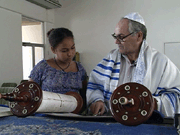
Adio Kerida (Goodbye Dear Love) 2002
Distributed by Women Make Movies, 462 Broadway, New York, NY 10013; 212-925-0606
Produced by Ruth Behar
Directed by Ruth Behar
VHS, color, 58 min.
College - Adult
Jewish Studies, Anthropology, Latin American Studies
Date Entered: 11/09/2018
Reviewed by Debra Mandel, Head Media Center, Northeastern University Libraries, Boston, MAIn Adio Kerida, University of Michigan anthropology professor Ruth Behar shares her personal mission to rediscover her Jewish-Cuban heritage. Born in Cuba from Sephardic (Spanish) and Ashkenazi (Eastern European) parents, Ruth’s family came to America in 1961 following the economic collapse of Castro’s communist revolution. Ruth and her son Gabriel travel to Havana 40 years later to trace her childhood roots and visit the community and sacred sites of the small remaining Jewish population. As Ruth says, she wants to believe in the possibility of return, and she ultimately experiences a depth of kindness from those who took care of her, Jews and non-Jews, and old family friends. Expert camera work captures the sensuality of the Cuban people, the poverty, and the determination of the aging Jewish community whose library books and prayer shawls have decayed beyond repair.
To complete her journey of self-identity, Ruth also explores the vibrant Cuban Jewish life in Miami, reminisces, laughs and eats Cuban food with her parents in New York, and chats with her musician brother in Philadelphia, who views Ruth’s anthropological quests with gentle sarcasm.
Adio Kerida is a well-paced, heartfelt documentary, filled with engaging conversation, romantic Sephardic and Cuban music, and dance. The editing is smooth (though this version has been shortened from an original 85-minute version) and the English subtitles are fine.
This film will be most suitable for University, public, and synagogue libraries with high school age and older audiences interested in anthropology and Jewish and Latin American Studies. Viewers will have a unique opportunity to learn much about this vanishing sector of Jewish life. Non-Jews and Latino/a audiences will also appreciate the cultural diversity explored in this film. It is quite a moving production.